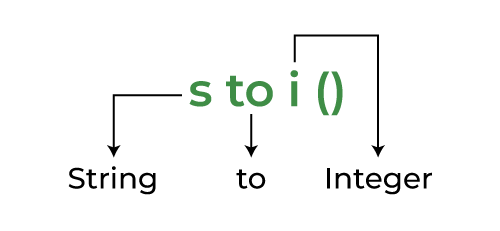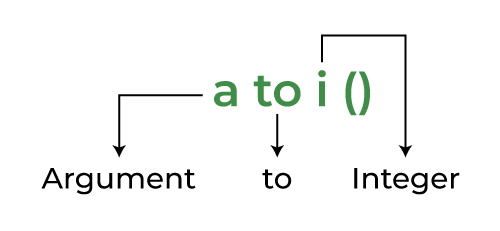Convert String to int in C++
Last Updated :
21 Sep, 2023
Converting a string to int is one of the most frequently encountered tasks in C++. As both string and int are not in the same object hierarchy, we cannot perform implicit or explicit type casting as we can do in case of double to int or float to int conversion. Conversion is mostly done so that we can convert numbers that are stored as strings.
Example:
str=”191″
num=191
There are 5 significant methods to convert strings to numbers in C++ as follows:
- Using stoi() function
- Using atoi() function
- Using stringstream
- Using sscanf() function
- Using for Loop
- Using strtol() function
1. String to int Conversion Using stoi() Function
The stoi() function in C++ takes a string as an argument and returns its value in integer form. This approach is popular in current versions of C++, as it was first introduced in C++11.
If you observe stoi() a little closer you will find out that it stands for:

Breakdown of stoi() in simple terms
Syntax:
int stoi(string str, size_t position = 0, int base = 10);
Parameters:
- str: string to be converted. (compulsory)
- position: starting position. (optional with default value = 0)
- base: base of the number system. (optional with default value = 10)
Example:
C++
#include <iostream>
#include <string>
using namespace std;
int main()
{
string str1 = "45";
string str2 = "3.14159";
char str3[] = "31337 geek";
int myint1 = stoi(str1);
int myint2 = stoi(str2);
int myint3 = stoi(str3);
cout << "stoi(\"" << str1 <<
"\") is " << myint1 << '\n';
cout << "stoi(\"" << str2 <<
"\") is " << myint2 << '\n';
cout << "stoi(\"" << str3 <<
"\") is " << myint3 << '\n';
return 0;
}
|
Output
stoi("45") is 45
stoi("3.14159") is 3
stoi("31337 geek") is 31337
As we can see, stoi() method supports both C++ style and C style strings.
We can also use atoi() function for performing this task.
2. String to int Conversion Using atoi()
The atoi() function in C++ takes a character array or string literal as an argument and returns its value in an integer. It is defined in the <stdlib.h> header file. This function is inherited by C++ from C language so it only works on C style strings i.e. array of characters.
If you observe atoi() a little closer you will find out that it stands for:

Breakdown of atoi() in simple terms
Example:
C++
#include <iostream>
#include <stdlib.h>
using namespace std;
int main()
{
char* str1 = "141";
char* str2 = "3.14";
int res1 = atoi(str1);
int res2 = atoi(str2);
cout << "atoi(" << str1 << ") is " << res1 << "\n";
cout << "atoi(" << str2 << ") is " << res2 << "\n";
return 0;
}
|
Output
atoi(141) is 141
atoi(3.14) is 3
stoi() vs atoi()
|
stoi()
|
atoi()
|
| 1. stoi() is added in C++ 11 |
1. atoi() is a legacy C-style function |
| 2. stoi() works for both C++ strings and C-style strings (character array and string literal) |
2. atoi() works only for C-style strings (character array and string literal) |
3. stoi() can take up to three parameters, the second parameter is for
starting index and the third parameter is for the base of the input number. |
3. atoi()takes only one parameter and returns an integer value |
|
4. Syntax:
int stoi (const string& str, size_t* index = 0, int base = 10);
|
4. Syntax:
int atoi (const char * str);
|
3. String to int Conversion Using stringstream Class
The stringstream class in C++ allows us to associate a string to be read as if it were a stream. We can use it to easily convert strings of digits into ints, floats, or doubles. The stringstream class is defined inside the <sstream> header file.
It works similar to other input and output streams in C++. We first create a stringstream object as shown below:
Syntax:
stringstream ss;
Then insert a numeric string into it using the ( << ) insertion operator.
Example:
ss << myString;
ss << myCstring;
ss << myInt; or float, or double, etc.
At last, we extract the numeric value from the stream using the ( >> ) extraction operator.
Example:
ss >> myChar;
ss >> myCstring;
ss >> myInt;
The below C++ program demonstrates how to convert a string to int using a stringstream object:
C++
#include <iostream>
#include <sstream>
using namespace std;
int main()
{
string s = "12345";
stringstream geek;
geek << s;
int x = 0;
geek >> x;
cout << "Value of x + 1 : " << x + 1;
return 0;
}
|
Output
Value of x + 1 : 12346
To summarize, stringstream is a convenient way to manipulate strings. This method also works for both C style strings or C++ style strings.
4. Converting String to int Using sscanf()
‘sscanf()‘ is a C-style function similar to scanf(). It reads input from a string rather than standard input.
Syntax of sscanf:
int sscanf (const char * source, const char * formatted_string, ...);
Parameters:
- source – source string.
- formatted_string – a string that contains the format specifiers.
- … : – variable arguments list that contains the address of the variables in which we want to store input data.
There should be at least as many of these arguments as the number of values stored by the format specifiers.
Return:
- On success, the function returns the number of variables filled.
- In the case of an input failure, before any data could be successfully read, the end of the function(EOF) is returned.
Example:
C++
#include <iostream>
using namespace std;
int main()
{
const char* str = "12345.0000046";
float x;
sscanf(str, "%f", &x);
cout << "The value of x : " << x << endl;
return 0;
}
|
Output
The value of x : 12345
5. Using For Loop Convert Strings into int
It is the naive method of string-to-int conversion where we compare each character to its ASCII values and then get the value of that numeric character.
Below is the C++ program used for loop to convert strings into numbers:
C++
#include <bits/stdc++.h>
using namespace std;
int main()
{
string number = "13";
int i = 0;
for (char c : number) {
if (c >= '0' && c <= '9') {
i = i * 10 + (c - '0');
}
else {
cout << "Bad Input";
return 1;
}
}
cout << i;
}
|
However, the above functions can not be used to convert the string with negative numbers to an integer. For this, we have to check that the string’s first index contains the “-” symbol if yes then we will convert the number to an integer and then use this “-” sign in front of this to symbolize that the number present in the string is a negative number.
6. String to int Conversion Using strtol()
Using the strtol functions: It converts a string to a long integer value, respectively.
Syntax of strtol():
long int strtol(const char* str, char** endptr, int base);
Parameters:
- str- Pointer to the null-terminated byte string to be converted
- endptr- Reference to a pointer to character. The function stores the address of the first invalid character in *endptr. If endptr is a null pointer, the function does not store this information.
- base- The number base to interpret the string. Must be between 2 and 36, inclusive, or 0. If base is 0, the function determines the base from the string itself. If the base is 16, the string may begin with the prefix “0x” or “0X”, in which case the number is parsed as a hexadecimal value.
Return:
- If the string is empty or does not contain any digits, 0 is returned.
- If the conversion is successful, the function returns the converted long integer value.
- If the conversion fails, the function returns 0 and sets *endptr to point to the beginning of the string.
Example:
C++
#include <stdio.h>
#include <stdlib.h>
int main() {
char str[] = "12345";
char* endptr;
long int value = strtol(str, &endptr, 10);
if (endptr == str) {
printf("No digits were found\n");
} else if (*endptr != '\0') {
printf("Invalid input: %s\n", str);
} else {
printf("The value is %ld\n", value);
}
return 0;
}
|
Output
The value is 12345
Time Complexity: O(N), where N is the number of characters in the string.
Auxiliary Space: O(1)
Like Article
Suggest improvement
Share your thoughts in the comments
Please Login to comment...